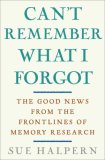Write your own review!
Heather
Good news?
The title and topic of this book were intriguing, but the "good news" of the subtitle was hard to find. Halpern is a proficient pop science writer, but one might suspect she was either testing our cognitive abilities or trying to exercise them by making the reader jump back and forth in time and place. The book does get fairly technical, but if you're interested in memory and memory loss, stick with it. Through Halpern, you'll meet many of the major names in the field and learn what they're working on.
Cecilia
Can't Remember What I Forgot by Sue Halpern
Since I’m not getting any younger, I was eager to read Sue Halpern’s
Can’t Remember What I Forgot: The Good News From The Front Lines of Memory Research. The second part of the title is misleading as it suggests that there is actual good news in the present. What she discovers in her years of chasing down experts, scientists, and nutritionists to gather the latest information about Alzheimer’s and other forms of dementia is that there are no answers now. She is certain the good news will happen someday but no one can say when. One is left wondering why she thought a personal account of her experiences in the
…more field would be of interest to the general public. Her writing is occasionally humorous but is more often technical and certainly not for the layman. Very disappointing. (less)I was extremely interested in the subject matter having lost two of my grandparents to Alzheimer's in recent years. Although Halpern did provide me with a better understanding of the disease, some of the more technical aspects were a bit boring. I was hoping from the title that the book would announce a real breakthrough in the area of memory recovery or battling dementia, but such a breakthrough appears to be quite a ways off. This book is essentially a summary of the author's meetings over the past number of years with neuroscientists and others chasing a cure for memory related diseases.
What I did find
…more enlightening - yet deeply disturbing - was the description of the manner in which research is carried out. It would appear most researchers tend to work secretly and independently from one another with a primary goal of publishing first or obtaining key patents that will result in profits for shareholders, rather than working together with the goal of finding a cure. (less)The author seems to be telling of her experience in researching the book; not giving a clear picture of the current research for memory loss. Ms. Halpern sited many studies, but none gave true hope for the victims of Alzheimer's or other illness.
I was disappointed.
Julie Zelman
Can't remember--don't care
I like reading popular science books, be they light, Mary Roach ("Stiff"), funny, Bill Bryson ("A Short History of Nearly Everything") or more challenging, Oliver Sacks ("Uncle Tungsten"). I expected this to be on the lighter side, a la Mary Roach, with the author candidly relating her own experiences. Unfortunately, she's not as engaging a writer, and I found myself bored by her scientific descriptions. Somewhere in the middle of the book the brain scans and MRI's she'd had started to seem repetitive, and it felt like the book wasn't going anywhere. Too bad. Maybe she needed something, a central event, to
…more anchor the book. Disappointing. (less)Anyone who has had a loved one touched by severe memory loss, or is in fear of it for themselves, is invited to open this book by way of an intriguing title. They will be disappointed. The author's reports of today's research were overwhelming at times; however, she does render them more understandable by her accompanying analogies. Even so, I feel it does little to alleviate the fears of memory loss which can be strong. Her discussions of the research being carried out offer small hope for any significant help in the near days to come.
After losing my mother to dementia six years before her actual death, I need
…more to know more than what is happening to the brain; I want to know why and what can be done about it. I did not feel this to be a helpful read. It is definitely not for the general reader. (less)As a member of the medical profession and as someone who has a family member with dementia, I looked forward to reading this book. I was sorely disappointed. Ms. Halpern appeared to be unable to decide whether she was telling her own story or giving a synopsis of current research in the area of memory loss. The title leads one to believe that this is a light read -- reader beware! Details of memory research are technical and boring. Ms. Halpern should stick to 1000 word articles for magazines as she was clearly out of her depth in writing this work. I really wanted to like the book, but it was an exercise in futility.
